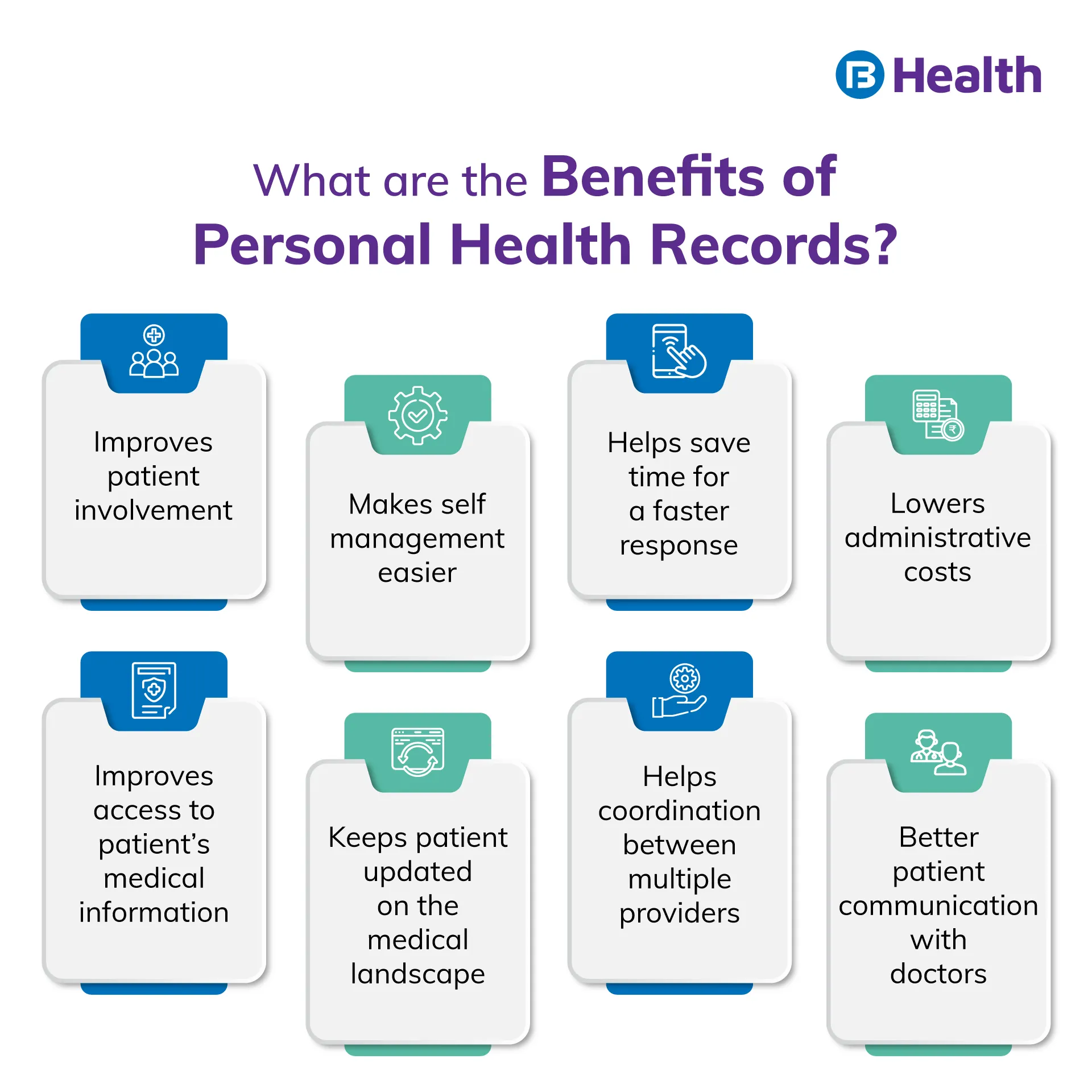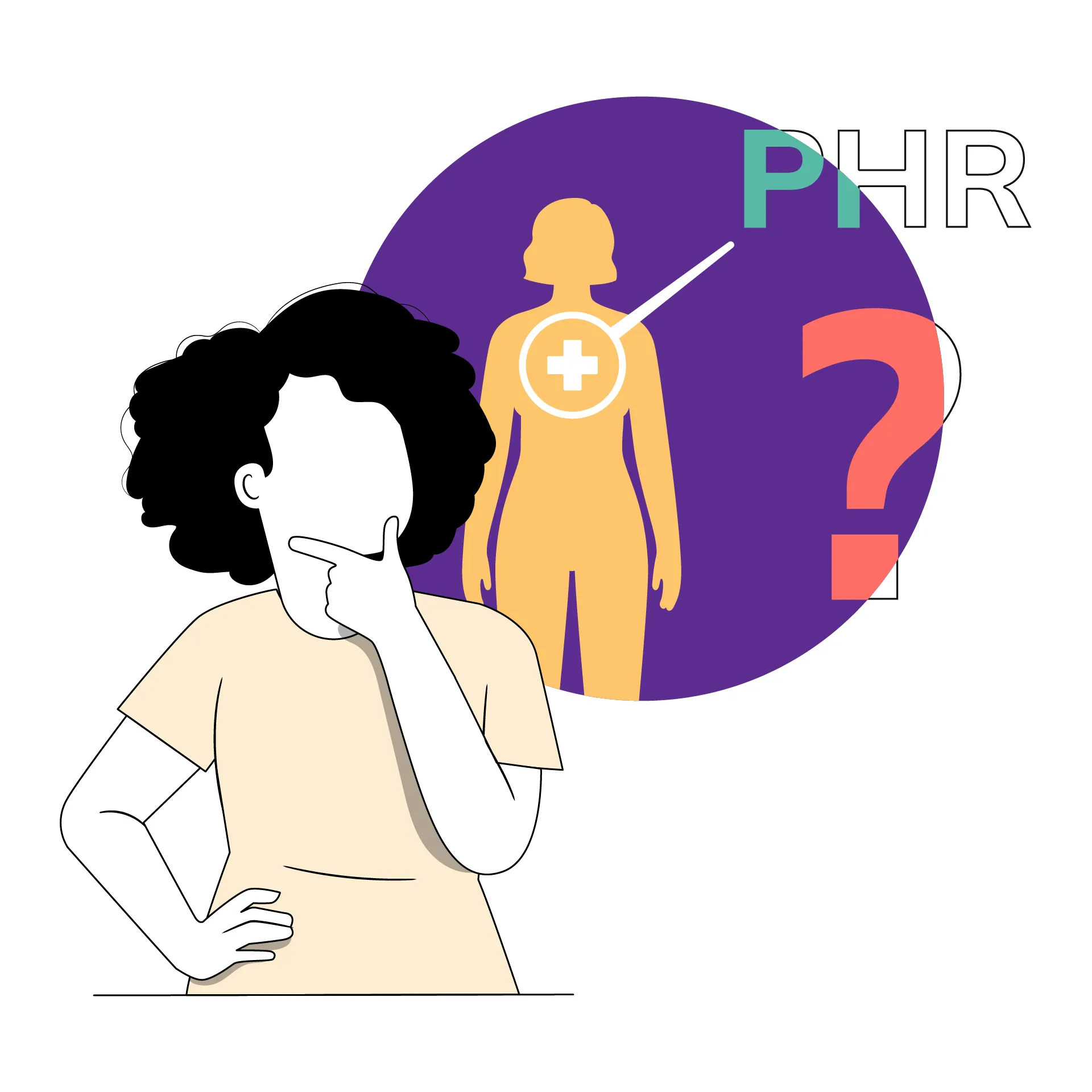General Health | 7 min read
What is a Personal Health Record or a PHR Address?
Medically reviewed by
- Table of Content
Synopsis
Digitisation has played a revolutionary role in doing business or performing even the simplest of tasks. The healthcare industry is also beginning to embrace the digital age to make taking care of your health much easier. Keep reading to find out what a digital health ID and personal health records (PHR) address are and their pros and cons.
Key Takeaways
- A digital health ID and PHR address are assigned to each individual to help them access their personal health records
- Personal health records contain the entire medical history of an individual along with their reports and much more
- In India, one can make an Ayushman Bharat Health Account for storing and sharing medical information
What is a Digital Health ID Card?
The digital health ID card is a digital identity card that contains identifying information about the cardholder (such as health records). The health ID card will have a PHR address and is used to simplify the process of digitally accessing and sharing the cardholder's health records. You will need an ABHA health ID card to participate in India's digital healthcare ecosystem.What Is A Digital Health ID?
A digital health ID or UHID number (Unique Health Identification) is a 14-digit number generated randomly and assigned to each individual. This health ID is different for everyone and will be linked to all your health records. This record will only be accessible with the beneficiary's informed consent across multiple systems and stakeholders.
The health ID is generated by combining a person's basic information with their mobile or Aadhaar number. A mobile application, a Healthcare Professionals Registry (HPR), and Healthcare Facility Registries can be used to link and view personal health records.
Additional Read: Ayushman Card DownloadHow Can You Request The Creation Of a Health ID?
A citizen can obtain an ABHA Health ID by visiting a health facility that includes government and private hospitals, community health centres, and government wellness centres throughout India. ABHA eligibility depends on whether you are a registered citizen of India.
You can also create your health ID or ABHA number under the Ayushman Bharat Scheme by visiting the national health authority website or downloading the ABHA app and following these steps:
Register using an Aadhaar or a Driving Licence
- Using Aadhaar Card: You can create your Health ID or ABHA number using an Aadhaar instantaneously. You must ensure that Aadhaar is linked to a Mobile Number as OTP authentication is required. However, you can visit your nearest ABDM facility if you do not have a mobile number linked.
- Using a Driver's Licence: You can initiate a request for Health ID or ABHA number using a driving licence as well. However, if you select this option, you will only get an enrolment number on the portal. You will then need to carry your driving licence to the nearest ABDM facility to get your identity verified by the staff. After which, you will get your ABHA number.
- After you enter your Aadhar card number or driver's licence, you will receive an OTP. Enter that code.
- After authentication of your Aadhar, you will instantly receive your ABHA number and card. You can then proceed to complete your profile. You will only get an enrolment number if you've registered with your driver's licence.

What is a PHR address?
ABHA address or PHR address means a self-declared username unique to each individual that is required to sign into an HIE-CM (Health Information Exchange & Consent Manager), which will enable consent management and sharing of a user's medical records. For example, your PHR address in a health ID may look like 'yourname@consentmanager.' An example of your PHR address in health ID with ABDM consent manager that will help in health data exchange for you with the consent on the ABDM network is xyz@abdm.
What are Personal Health Records (PHR)?
Your PHR address is linked to all your personal health record (PHR). Personal health records are electronic health records in which patients maintain health data and other information about their care entered by their doctors. [1]. A PHR's goal is to provide a comprehensive and accurate summary of an individual's medical history that is accessible online. Patient-reported data, lab results, and data from devices such as wireless electronic weighing scales or collected passively on a smartphone could all be found with a PHR address on your PHRs.
Typical personal health record include the following:
- Information about visits to the doctors
- Patient's allergies
- Family medical history
- Details on immunisations
- A list of medications and drugs taken
- Records of hospitalisation
- Information about medical conditions or diseases
- Information about any medical procedures or surgeries performed
Benefits of PHRs
Improves Patient Involvement:
Patients can use their PHRs to access various health information sources and the best medical practices. Instead of paper-based files in different doctors' offices, all of an individual's medical records are stored in one location. As a result, when patients are diagnosed with a medical condition, they can better access test results, better voice their concerns with their doctors, and share information with others experiencing similar symptoms.
Improves Access To Patient's Medical Information:
PHRs can help clinicians. PHRs allow patients to submit their data to their clinicians' EHRs. Providing more continuous data may help clinicians make better treatment decisions, improving care efficiency. You can also link public health programmes and insurance schemes like the complete health solution to your PHR address.Additional Read: Government Health Insurance Schemes
Keeps Patient Updated on The Medical landscape
PHRs can assist in analysing an individual's health profile and identifying health threats and improvement opportunities based on an analysis of drug interactions, current best medical practices, gaps in current medical care plans, and the identification of medical errors.
Helps Coordination Between Multiple Providers
Patient illnesses can be tracked in collaboration with healthcare providers and promote early interventions when a deviation in health status is detected. PHRs also make it easier for care providers and clinicians to care for their patients by allowing continuous communication.
Better Patient Communication with Doctors
Eliminating communication barriers and allowing timely documentation flow between patients and clinicians can save time on face-to-face meetings and phone calls. Improved communication can make it easier for patients and caregivers to ask questions, schedule appointments, request refills and referrals, and report issues.
Makes Self-Management Easier
Patients with access to their records may be better able to manage their health conditions. They can keep track of how their condition is progressing. For those with poor memories, simply downloading their card that has their PHR address and health ID number is sufficient to access all their medical records.
Helps Save Time for A Faster Response
PHR enables health providers to respond quickly due to the availability of healthcare data. No time is wasted trying to figure out the patient's medical history. This could be life-saving in emergencies when doctors have to respond fast but have no time. A PHR can quickly provide critical information for proper diagnosis or treatment. [2]
Lowers Administrative Costs
Public health records reduce the burden on healthcare organisations. For example, the staff can spend less time searching for patient information and responding to patient questions.
Additional Read: What is Unified Health InterfaceBarriers to PHRs
Despite the several potential benefits, there are many concerns facing PHRs, including:
Technological barriers
A patient's lack of how to use technology, especially seen in the elderly, could make it hard for them to access their PHRs. In addition, poor access to the internet or not having a computer or phone might be a barrier for certain people, particularly those living in rural areas.
Privacy concerns
However unlikely, the possibility of PHRs being hacked, resulting in the disclosure of sensitive information, might dissuade some.Literacy barriers
Lack of one's ability to read or even the lack of health-related knowledge could be a potential barrier for some. Data accuracy could be affected if users need to add their own information and face issues in doing so due to health illiteracy.
PHR address is needed to sign into a health information exchange and consent manager that contains PHRs. PHRs are crucial health-related information that can be accessed by the individual, family members who have permission and doctors. As seen above, there are several benefits and a few barriers to this new digital system of managing health records. However, it is a great step towards efficiency and helping healthcare become more integrated and unified.
If you found this article helpful, you can visit Bajaj Finserv Health for more information. Joining the digital revolution, Bajaj Finserv Health also offers online doctor consultations so that you can get an expert opinion from the comfort of your home.
- References
- https://www.ncbi.nlm.nih.gov/pmc/articles/PMC1447551/
- https://www.ncbi.nlm.nih.gov/books/NBK557757/
- Disclaimer
Please note that this article is solely meant for informational purposes and Bajaj Finserv Health Limited (“BFHL”) does not shoulder any responsibility of the views/advice/information expressed/given by the writer/reviewer/originator. This article should not be considered as a substitute for any medical advice, diagnosis or treatment. Always consult with your trusted physician/qualified healthcare professional to evaluate your medical condition. The above article has been reviewed by a qualified doctor and BFHL is not responsible for any damages for any information or services provided by any third party.



